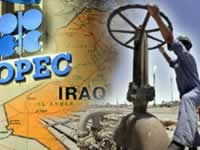OPEC to forgo production cut
OPEC was expected to keep its production level unchanged Wednesday, and Kuwait 's oil minister predicted prices would fall below the US$60 per barrel threshold in the second quarter. Sheik Ahmed Fahd Al Ahmed Al Sabah of Kuwait who believes geopolitical tensions are adding US$5 to US$8 to each barrel said he thinks prices will drop below US$60 by the end of June, but are likely to rebound to the US$60 range in the fourth quarter.

Oil ministers meeting behind closed doors at the headquarters of the Organization of Petroleum Exporting Countries conceded that prices were uncomfortably high, but cautioned against lowering output at a time when extremists are attacking energy installations in Nigeria and the Middle East . Many OPEC members repeatedly have said that prices are optimal in the US$40-US$50 range.
But they have hovered considerably higher for months: On Wednesday, light, sweet crude for April delivery was down 18 cents to US$61.40 a barrel on the New York Mercantile Exchange. April Brent on the ICE Futures exchange fell 11 cents to US$61.06 a barrel.
Al Sabah said the 11-nation cartel which pumps a third of the world's oil should maintain its current output quota of 28 million barrels a day, and he ruled out a production increase for the rest of the year. That target does not include Iraq , which adds an additional 1.5 million barrels.
Venezuela 's oil minister, Rafael Ramirez, said Wednesday he would postpone his push to get OPEC to cut production by at least half a million barrels a day. The South American country is one of the group's most strident voices in favor of constraining output to keep prices high.
Ramirez has maintained that the market is oversupplied by at least 500,000 barrels a day, and contends the surplus will widen to as much as 2 million barrels a day if demand falls as expected in the second quarter. But with no public support from other members, he said he would make his case again at the next OPEC meeting in June.
"The worries are there but ... we may have to wait for the next meeting," he said. Mohammed al-Hamli, oil minister of the United Arab Emirates , insisted the cartel's output was "already adequate." Worries over Iran 's nuclear ambitions, militant threats in Nigeria and attacks on Middle East facilities stoked concerns about supply disruptions as OPEC mapped out its pumping and pricing strategies for the spring and summer.
Saudi Arabia has tightened security measures around its energy installations in the wake of the Feb. 24 bombing outside the gates of its Abqaiq facility, the world's largest oil-processing plant, Saudi Oil Minister Ali Naimi said Wednesday. "Naturally after something like, that security goes up. We have been taking additional measures," including the option of using surface-to-air missiles to thwart any airborne attacks and arming security forces with higher-powered weapons, Naimi said.
Recent attacks by militants on Nigerian pipelines and oil facilities have reduced the country's production by 455,000 barrels a day. Nigeria normally exports 2.5 million barrels daily. Edmund Daukoru, OPEC's president and Nigeria 's oil minister, said the African nation was "committed to providing adequate security for operators in the ( Niger ) Delta." He said Nigeria planned to pump an additional 600,000 barrels a day by June, reports the AP.
N.U.
Subscribe to Pravda.Ru Telegram channel, Facebook, RSS!


